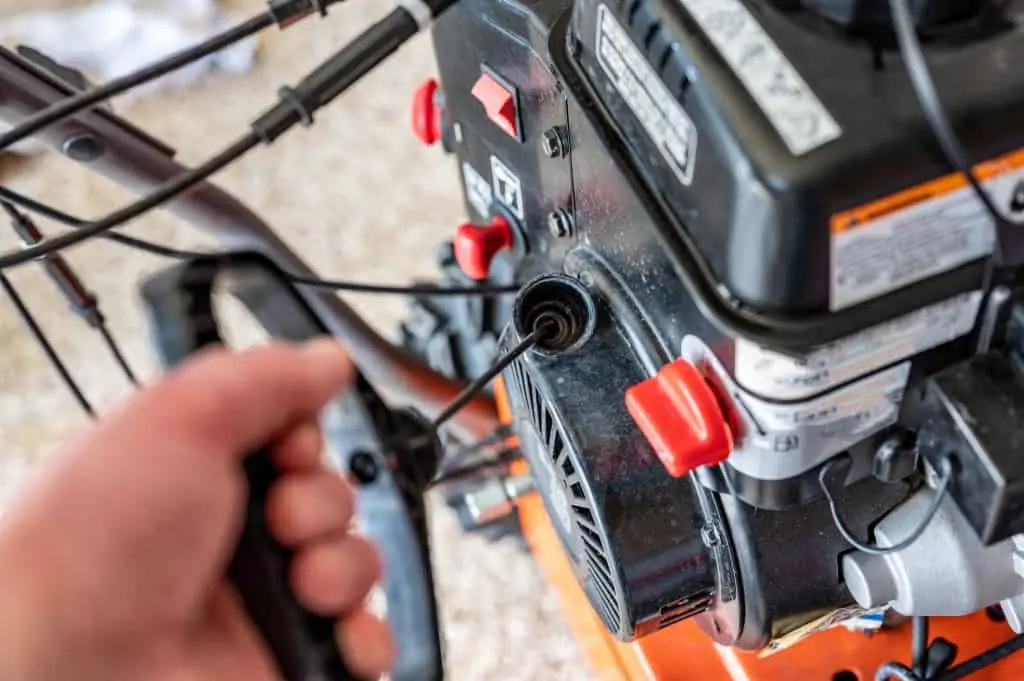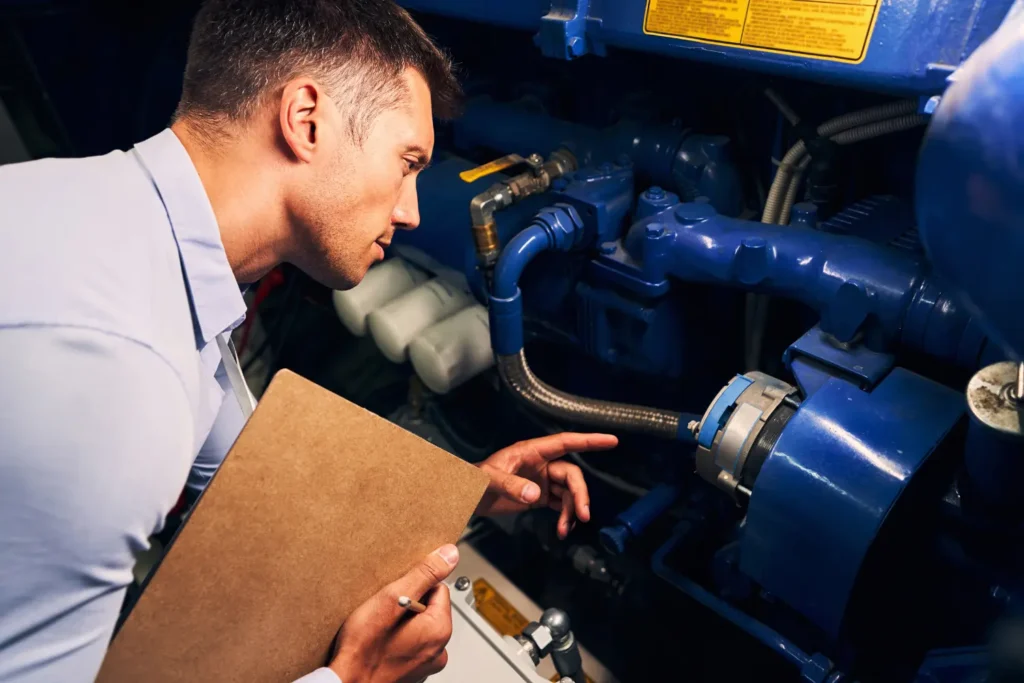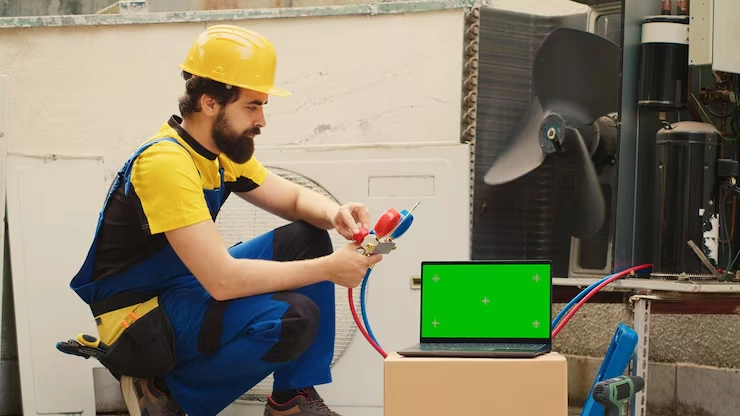Generators can stop working for many reasons. The most common generator problems include weak batteries, clogged fuel lines, low coolant levels, and overheating.
Fixes range from checking fuel levels and spark plugs to cleaning the air filter or resetting the circuit breaker. If the generator still stops working, you may need professional generator services for safe and lasting repairs.
At Grounded Electric, we know how important backup power is for homes and businesses. Led by Robert “Bobby” Mulholland and Barret Abramow, our licensed team has decades of experience solving generator issues. This guide explains common generator problems and solutions so you know what to check and when to call an expert.
Key Takeaways
- The most common generator problems are starting failures, weak batteries, clogged fuel, low coolant, overheating, and loss of power.
- Diesel generators often face wet stacking, fuel contamination, and valve buildup, while portable models struggle with carburetor clogs and hard starts.
- Quick fixes like checking spark plugs, fuel levels, and circuit breakers help with simple issues, but leaks or electrical faults need expert repair.
- Regular coolant checks, oil, and filters, plus running the generator often, lower the risk of breakdowns.
- Experts Robert “Bobby” Mulholland and Barret Abramow stress safe troubleshooting and professional generator services for reliable results.
Most Common Generator Problems
Generator not working or won’t start
A common issue is when the generator will not start. This can happen if the fuel tank is empty, the spark plugs are dirty, or the control switch is not in the reset position. Always check these basics first. If it still does not start, test the circuit breaker and wiring.
Quick Fix: Make sure the fuel tank is full, the plugs are clean, and the switch is reset.

Battery problems
Weak or dead batteries are another cause of failure. Dirty or corroded terminals can block current. Clean the posts with a wire brush and confirm the charger works. If the problem continues, replace the battery.
Quick Fix: Clean the battery posts and test the charger before replacing.
Fuel clogs and leaks
Fuel lines can clog with dirt, condensed water, or sludge from old fuel. This causes poor performance when the generator runs. Drain the tank and clear fuel lines if needed. Call for generator services if you notice a leak.
Quick Fix: Drain old fuel and check lines for sludge or water.
Low coolant or oil
Low coolant levels make the generator overheat. This often means there is a coolant leak or missed maintenance. Check levels often and top them up if low. For leaks, call a professional to fix the problem.
Quick Fix: Add coolant right away and book service if a leak is found.
Overheating shutdowns
Generators may shut off if airflow is blocked or the air filter is dirty. Poor cooling can also come from blocked exhaust. Replace the air filter and check airflow to prevent shutdowns. If it continues, call a technician.
Quick Fix: Replace the filter and check for proper airflow.
No power output
Sometimes the generator runs but does not make power. This is often a tripped circuit breaker or loose wiring. Reset the breaker and check the output cables. If power still does not return, call an electrician.
Quick Fix: Reset the breaker and check all cables.
Other Technical Generator Problems
Air in the fuel system
Air trapped in fuel lines can stop the generator from starting. Bleeding the lines removes the air. This is a simple job for a technician.
Debris in intake or exhaust valves
Dust or carbon buildup can block valves and cut airflow. This makes the generator stall. Cleaning the valves keeps performance steady.
Quick Fix: Check for blockages and call for valve cleaning if needed.
Diesel Generator Problems and Solutions
Diesel generators face problems like wet stacking, fuel contamination, and valve buildup. If you are comparing systems, see our guide on the diesel generator vs propane generator to learn about performance and care needs.

Wet stacking in diesel engines
Wet stacking is when unburned fuel builds up in the exhaust. This happens if the diesel generator runs with a low load for long periods. Running the generator at full load prevents it. In some cases, deposits must be cleaned. For reliable models, see our picks for the best diesel generator.
Fuel contamination issues
Diesel tanks often collect water and bacteria. This clogs fuel lines and lowers performance. Use additives and inspect fuel often to prevent this. If the tank is badly contaminated, cleaning is needed. To boost performance, check how diesel electric generator efficiency impacts costs and output.
Exhaust and valve blockages
Buildup in the exhaust and valves can make the generator stall. Regular cleaning and part replacement prevent this. Without care, long-term damage may occur.
Portable Generator Problems and Solutions
Hard starting after storage
If left unused, portable generators may not start. Old fuel or dirty spark plugs are the main reasons. Replacing plugs and draining old fuel often solves it. Use stabilized fuel before storage to avoid this.
Carburetor and spark plug issues
Carburetors often clog in portable units. Cleaning the carburetor and checking spark plugs helps with steady ignition. If lines stay blocked, service is needed.
Inconsistent power supply
Portable generators may give uneven power. This happens if the fuel tank is low or the breaker trips. Fill the tank and check the breaker to fix it. If the problem remains, the alternator may need repair.
Brand-Specific Generator Problems
Generac common problems
Generac models often have control switch or battery issues. Check switches and test the battery.
Firman common problems
Firman units may clog with dirt in fuel lines or carburetors. Cleaning and safe storage help avoid this.
Champion common problems
Champion generators often need air filter and spark plug changes. Replacing them extends life.
One common problem
Onan models may trip breakers or face wiring faults. Resetting breakers usually fixes the problem.
Preventive Maintenance Tips
Routine inspections and fluid checks
Check fuel, coolant, and oil often. Catching leaks early saves on bigger repairs.
Running your generator regularly
Run the generator often to keep fuel fresh and fluids moving. This prevents buildup in the system.
Scheduling professional service
Experts like Robert “Bobby” Mulholland and Barret Abramow suggest service every six months. This ensures safety and keeps systems code compliant.
Maintenance Checklist
- Weekly: Check fuel levels, fuel lines, and the battery charger.
- Monthly: Check coolant, oil, and the air filter.
- Every 6 months: Run the generator under load and book service.
Final Thoughts on Generator Care
Generators protect homes and businesses when power fails. Keeping them reliable means checking fluids, cleaning filters, and calling experts when needed.
At Grounded Electric, Bobby Mulholland and Barret Abramow lead a team with decades of experience in generator problems and solutions. Their guidance helps owners handle small issues safely and know when expert support is required. Call Grounded Electric today to get expert help with your generator.
FAQs on Generator Problems
Why is my generator not working?
Check the fuel tank, spark plugs, coolant levels, and breaker first. These are the main causes. If it still fails, call a professional for help.
What is the most common generator problem?
Weak batteries and clogged fuel lines are the most common generator problems. Regular checks reduce both risks.
How do I fix generator issues safely?
Do simple checks first. For leaks, wiring faults, or coolant issues, call qualified generator services.



